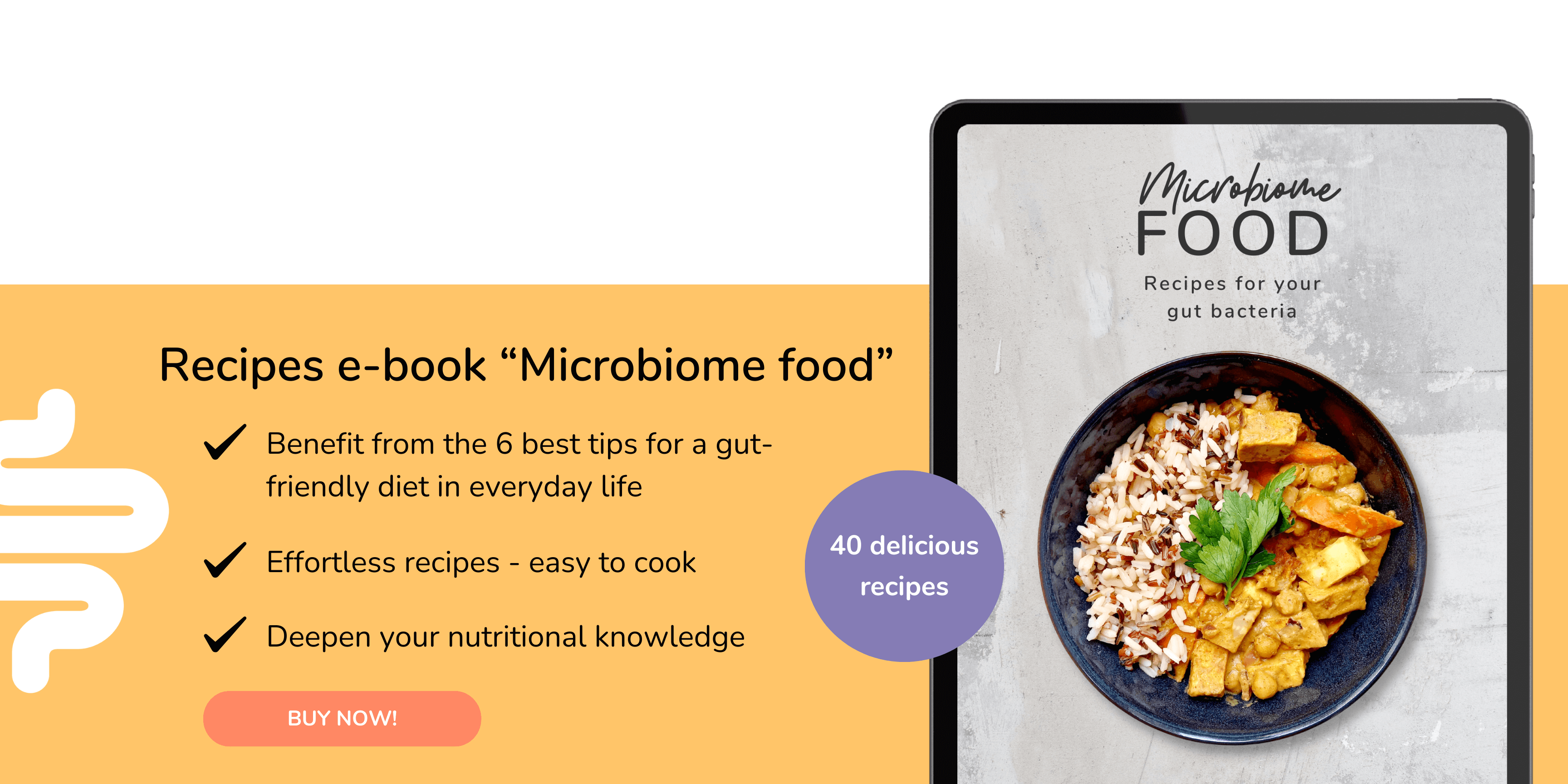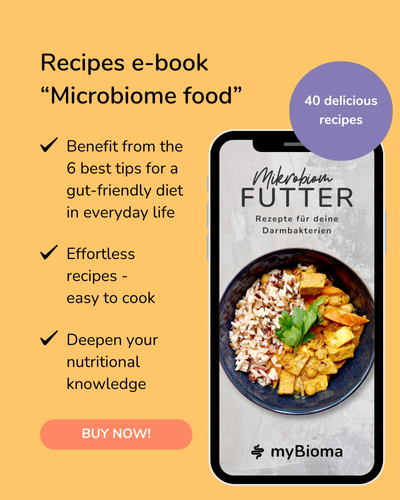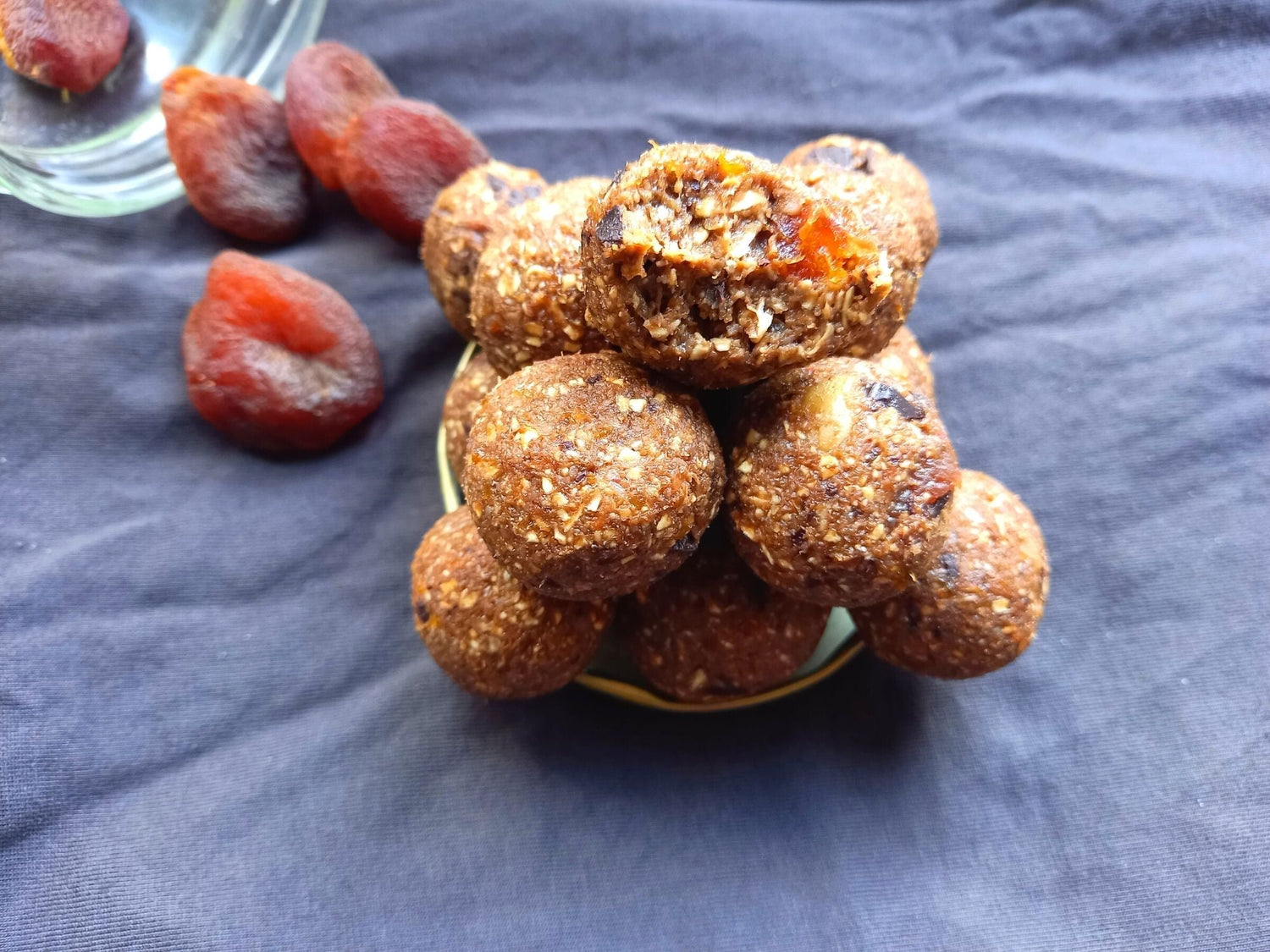Table of contents
- Which foods can influence your mood?
- What exactly is the Mediterranean diet?
- Diversity instead of superfood
- Gut microbiome, diet and mood - what is the connection?
- How serotonin production can be boosted by food
- Which foods can make you happy?
- The right diet for the gut-brain connection
- Recipes to strengthen your gut-brain axis
Good food – good mood: Is it possible to influence mental health with the right diet? Maybe you've already noticed that your mood significantly influences your choice of food? In stressful situations it can happen that we reach for unhealthy snacks more often. But have you ever thought about the fact that the other way around: Can food affect your psyche?
We know that a healthy and balanced diet is beneficial for our physical well-being. We try to influence our body shape and performance with diets. But what about mental influence? Is it possible to support our mental health with the right food?
Which foods can influence your mood?
Research in the field of “nutritional psychiatry” is attracting more and more attention. Rightly so, because it begins to reveal how our eating habits affect our mood and can thus counteract mental illnesses. A typical western diet, which is known Being low in fiber and high in fat and sugar from processed foods has been linked to a greater likelihood of psychological symptoms and disorders (1). In contrast, the Mediterranean diet rich in plant fiber has been observed to improve and reduce the risk of various health conditions, including depression and anxiety (1-3).
Recent studies have also shown that that people who adhere best to the Mediterranean diet over a longer period of time have a lower risk of developing depression than people who adhere less to it (4).

Mediterranean diet rich in useful fats, polyphenols and fiber
What exactly is the Mediterranean diet?
This diet is based on the traditional eating habits of the people living around the Mediterranean and is rich in fruits, vegetables, nuts, seeds, legumes, grains, fish, as well as olive oil and red wine (enjoyed in moderation!) . This diet style is generally rich in beneficial fats, polyphenols and fiber, with more protein coming from vegetables than animals. (5.9)
Diversity instead of superfood
The long list of whole foods typically consumed on a Mediterranean diet shows that it is no single “superfood” exists that can improve our well-being. Rather, there are a number of foods that can be beneficial for us.
This is also the case with your intestinal microbiome health. The more diverse your microbiome, the healthier you are. Find out now what your diversity is like.
This is because foods are complex and many different nutrients are contained in a single food. The same message is clear when it comes to our gut microbiome. No, there is no single “superfood” that nourishes all the beneficial bacteria, including us. Eating a high-fiber, plant-based diet with as much variety as possible contributes to a diverse range of prebiotics that nourish our friendly gut bacteria (6,7). If the beneficial bacteria in our intestines are well cared for, they also help us to improve our well-being and quality of life.
Gut microbiome, diet and mood - what is the connection?
Our intestinal microbiome is home to tons of bacteria and other microorganisms and is also called second brain designated. Within this bacterial community live species that can break down fiber and produce short-chain fatty acids (SCFAs) such as butyrate and propionate. These helpful substances play different roles in our health and well-being and may influence how well we feel. (5)
How serotonin production can be boosted by food
You've probably heard of the happiness hormone serotonin. It is considered a mood stabilizer and helps us be happier, less stressed and anxious. The good news is that butyrate and propionate produced in the gut microbiome can stimulate our intestinal cells to produce serotonin (8). Almost 90% of serotonin is produced in our intestines. So if we consume sufficient amounts of fiber in our diet, we can theoretically optimize the production of SCFAs and ultimately our serotonin levels and therefore our psychological well-being.
Which foods can make you happy?
Today we will show you 5 additional foods that you can integrate into your diet and that can support a good mood:
1. Dark chocolate (at least 70% cocoa content)
Dark chocolate contains a large number of so-called bioactive ingredients such as phenylethylamine and flavonoids, which can trigger euphoria-like feelings and lift your mood. It also has a positive effect on the gut microbiome, which can increase serotonin production in the gut. (10, 11)
2. Nuts and seeds (cashews, almonds, peanuts, hazelnuts and walnuts, chia, linseed and hemp seeds)
Nuts and seeds contain many important nutrients that can generally boost your mood, reduce brain fog, increase your motivation and relax you. In other words, real all-rounders! These effects are due to the magnesium, B vitamins, tyrosine (precursor of dopamine), tryptophan (precursor of serotonin) and omega-3 fatty acids they contain. (12)
3. Berries
Berries contain many flavonoids. Flavonoids are secondary plant substances that are known for their health effects on the whole organism, promote the health of the intestinal flora and can brighten the mood. Blue berries such as blueberries, blackberries and blackcurrants are particularly rich in flavonoids. (13)
4. Fatty fish (salmon, mackerel, sardines)
Contains valuable omega-3 fatty acids, which have an anti-inflammatory effect in the body, reduce anxiety and can potentially even alleviate depressive symptoms. (14, 15)
5. Yogurt and fermented foods
Yogurt, kefir, sauerkraut and kimchi contain live bacteria (probiotics) that support gut health. A healthy gut can influence the production and regulation of neurotransmitters such as serotonin and have an anti-inflammatory effect, which can contribute to a better mood. There is also evidence that fermented foods can have a mitigating effect on depression or anxiety disorders. However, further studies are still needed here. (16)
The right diet for the gut-brain connection
Although studies show that diet can play an important role in our mental health, it should not replace treatment prescribed by qualified mental health professionals. Nevertheless, studies have proven that sticking to a plant-rich diet over a long period of time has the greatest positive impact on our gut-brain axis connection.
Recipes to strengthen your gut-brain axis
So that you can get inspiration about what you can eat to make your intestinal brain happy, have a look at our Recipes-blog!
References
- Jacka FN, Pasco JA, Mykletun A, Williams LJ, Hodge AM, O’Reilly SL, Nicholson GC, Kotowicz MA, Berk M. .Association of Western and Traditional Diets with Depression and Anxiety in Women. American Journal of Psychiatry 2010 167:3, 305-311
- Sanchez-Villegas A, Martinez-Gonzalez MA, Estruch R, Salas-Salvado J, Corella D, Covas MI, Aros F, Romaguera D, Gomez-Gracia E, Lapetra J, Pinto X, Martinez JA, Lamuela-Raventos RM, Ros E, Gea A, Warnberg J, Serra-Majem L.. Mediterranean dietary pattern and depression: the PREDIMED randomized trial. BMC Medicine. 2013;11:208
- Lai JS, Hiles S, Bisquera A et al. A systematic review and meta-analysis of dietary patterns and depression in community-dwelling adults. Am J Clin Nutr. 2014;99:181-197
- Lassale C, Batty GD, Baghdadli A, Jacka F, Sanches-Villegas A, Kivimaki M, Akbaraly T. .Healthy dietary indices and risk of depressive outcomes: a systematic review and meta-analysis of observational studies. Molocualr Psychiatry. 2018; 24:965-986.
- Sing RK, Chang H, Yan D, Lee KM, Ucmak D, Wong K, Abrouk M, Frarhnik B, Makamura M, Zhu TH, Bhutani T, Liao W. Influence of diet on the gut microbiome and implications for human health. Journal of Translational Medicine. 2017;15:73
- Williams, Barbara et al. Gut fermentation of dietary fibres:physico-chemistry of plant cell walls and implications for health. International journal of molecular sciences. 2017;18(100):2203
- Gibson, G. R. et al. Expert consensus document: The International Scientific Association for Probiotics and Prebiotics (ISAPP) consensus statement on the definition and scope of prebiotics. Nat. Rev. Gastroenterol. Amp Hepatol. 14, 491 (2017).
- Reigstad CS, Salmonson CE, Rainey JF, Szurszewski, Linden DR, Sonnenburg JL, Farrugia G, Kashyap PC. Gut microbes promote colonic serotonin production through an effect of short-chain fatty acids on enterochromaffin cells. FASEB Journal. 2019;29:1395-1403
- Warnberg J, Serra-Majem L. Mediterranean dietary pattern and depression: the PREDIMED randomized trial. BMC Medicine. 2013;11:208
- Is there a relationship between chocolate consumption and symptoms of depression? A cross‐sectional survey of 13,626 US adults. Sarah E. Jackson, Lee Smith, Joseph Firth, Igor Grabovac, Pinar Soysal, Ai Koyanagi, Liang Hu, Brendon Stubbs, Jacopo Demurtas, Nicola Veronese, Xiangzhu Zhu, Lin Yang. Depression and Anxiety, https://doi.org/10.1002/da.22950.
- Shin JH, Kim CS, Cha L, Kim S, Lee S, Chae S, Chun WY, Shin DM. Consumption of 85% cocoa dark chocolate improves mood in association with gut microbial changes in healthy adults: a randomized controlled trial. J Nutr Biochem. 2022 Jan;99:108854. doi: 10.1016/j.jnutbio.2021.108854. Epub 2021 Sep 14. PMID: 34530112.
- Halder, Shreyasi, and Kazi Layla Khaled. "An extensive review on the relationship between food and mood." (2013).
- Curtis, Peter J., et al. "Chronic and postprandial effect of blueberries on cognitive function, alertness, and mood in participants with metabolic syndrome–results from a six-month, double-blind, randomized controlled trial." The American Journal of Clinical Nutrition (2024).
- Wang L, Liu T, Guo J, Zhao T, Tang H, Wang F, Dong F, Chen J, Tang M. N-3 PUFA supplementation alleviates anxiety symptoms by manipulating erythrocyte fatty acid levels in depression. Eur J Nutr. 2024 May 17. doi: 10.1007/s00394-024-03421-y. Epub ahead of print. PMID: 38758363.
- Kiecolt-Glaser JK, Belury MA, Andridge R, Malarkey WB, Glaser R. Omega-3 supplementation lowers inflammation and anxiety in medical students: a randomized controlled trial. Brain Behav Immun. 2011 Nov;25(8):1725-34. doi: 10.1016/j.bbi.2011.07.229. Epub 2011 Jul 19. PMID: 21784145; PMCID: PMC3191260.
- Aslam, H., Green, J., Jacka, F. N., Collier, F., Berk, M., Pasco, J., & Dawson, S. L. (2018). Fermented foods, the gut and mental health: a mechanistic overview with implications for depression and anxiety. Nutritional Neuroscience, 23(9), 659–671. https://doi.org/10.1080/1028415X.2018.1544332







